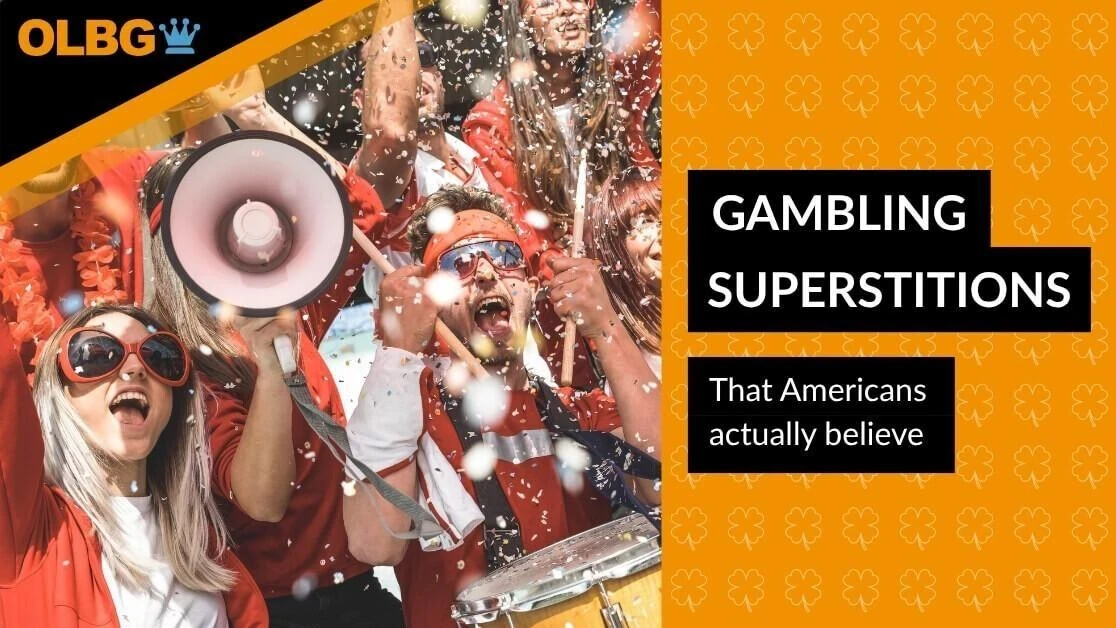
I've spent over 20 years inside the betting industry. I'll guide you to avoid the hype, ignore the noise, and steer clear of the common pitfalls that catch out everyday punters.
Americans love a flutter, and many believe a little luck can go a long way. From carrying rabbit’s feet to blowing on dice, gambling in the United States is full of rituals and superstitions designed to coax Lady Luck to the table. But just how common are these beliefs?
Research shows the vast majority of gamblers admit to having at least one superstition. In fact, nationwide surveys suggest that nearly 80% of gamblers stick to some kind of lucky ritual or charm. We’ve looked through multiple studies and data sources to round up the most popular gambling superstitions Americans swear by; not ranked, just the favourites that keep players feeling lucky. Talk about doubling down on luck!
Key Findings
- Most gamblers have a superstition: Around 80% of gamblers say they follow at least one lucky ritual or belief when gambling. Even among those who claim not to believe in luck, many still carry a “just in case” charm or habit.
- “Good luck” rituals are common: The most popular superstition among American gamblers is performing a specific action for luck – such as crossing fingers, tapping the slot machine, or blowing on dice – with over a third saying they do this routinely. Close behind, around a quarter of gamblers swear by rubbing a lucky item like a token or pair of dice before placing a bet.
- Lucky charms and clothing: About one in four Americans carry a lucky charm at least occasionally, and some surveys put that figure closer to four in ten. Many gamblers also have lucky clothing; roughly 14% wear a particular item for good fortune, and around 12% even reserve “lucky” underwear for big games or casino nights.
- Numbers matter: Six in ten Americans have a lucky number, with seven being the clear favourite. Other popular choices include three, thirteen, twenty-one, and nine. On the flip side, the number thirteen remains widely feared – so much so that some casinos skip the 13th floor altogether.
- Sports betting rituals abound: Superstition isn’t confined to casinos. Roughly two-thirds of U.S. sports fans admit to following certain game-day rituals when betting or watching their team. Common habits include always sitting in the same seat, wearing the same jersey, carrying a lucky token, or even eating the same pre-game meal for good luck.
- Taboos and quirky beliefs: Many bettors avoid jinxes at all costs. Some never use $50 bills to place bets, a long-standing Las Vegas superstition. Others shush anyone who says “good luck” before a wager. A few even refuse to bet on their own favourite team, fearing they might jinx the outcome.
With those highlights in mind, let’s explore these superstitions in more detail – from lucky charms to bizarre betting taboos – and see why so many Americans make superstition part of their game plan.
Lucky Charms and Good Luck Objects
One of the most popular ways Americans try to tilt the odds in their favour is by carrying lucky charms or objects. These range from traditional tokens such as a rabbit’s foot, four-leaf clover, horseshoe, or lucky coin, to more personal trinkets like a gifted casino chip or a special photo. Surveys suggest that around a quarter of Americans carry a lucky charm at least occasionally, while some research puts that figure closer to four in ten among regular gamblers. The belief is simple: having a piece of portable luck in your pocket or purse might just bring you a win.
Common lucky charm items reported by gamblers include small keepsakes or jewellery. In fact, more than half of those who wear a lucky item choose jewellery such as a pendant or ring. Others prefer more unusual charms. Poker legend Wild Bill Hickok was said to carry a rabbit’s foot, while some modern gamblers keep a lucky two-dollar bill or even a horned toad’s toenail as a charm. It might sound odd, but when money is at stake, many believe that any extra luck helps. As one old gambling saying goes, “It’s unlucky to be superstitious.” That never stops players from clinging to their charms just in case.
Lucky Clothing and Colours
If you have ever noticed someone in a casino wearing a bright red jacket or a “lucky hat,” it is not a fashion accident; it is superstition. Wearing specific lucky clothing is a cherished ritual for many gamblers and sports fans alike. Around 14% of gamblers say they wear a particular item of clothing for luck when they play. This could be anything from a shirt they once hit a jackpot in, to a pair of “winning socks,” or that lucky cap that has never been washed during a hot streak.
Almost half of sports fans have a game-day superstition that involves wearing their luckiest piece of clothing, making it the most common ritual among bettors and fans. Whether it is a team jersey or, believe it or not, lucky underwear, many are devoted to their ritual attire. Even professional athletes take part; baseball star Jason Giambi famously wore a golden thong to break out of a slump.
Colour plays a part too. Red is considered a lucky colour in many cultures, and gamblers often embrace it, from red clothing to red décor in casinos. It is no coincidence that many casino carpets and walls are red. In some traditions, particularly those influenced by Asian superstitions, wearing red underwear while gambling is thought to attract prosperity.
A small number of players also have a personal lucky colour. Surveys show that around one in ten people have a colour they associate with good fortune, and some will deliberately wear it when betting. On the other hand, a few gamblers avoid colours they believe bring bad luck. This is highly personal. One person’s lucky red might be another’s jinx colour.
The bottom line is simple. Wearing lucky clothing, whether it is a hat, shirt, or pair of socks, helps gamblers feel more confident, as if they are quite literally wearing their luck on their sleeve.
Rituals and Gestures for Good Luck
Superstitions are not just about objects; they are also about actions. Gamblers often perform small rituals or gestures they believe will invite good luck or ward off bad luck. Performing a specific action is one of the most common gambling superstitions, with over a third of American online gamblers saying they always do a particular ritual for luck.
These rituals can be subtle or theatrical. A classic example is crossing your fingers at the slot machine or roulette table, hoping for a favourable outcome. Others include knocking on wood to prevent bad luck, or throwing coins into a casino fountain while making a wish. Many gamblers see these habits as harmless ways to influence fate, even if only symbolically.
Perhaps the most iconic gesture of all is blowing on dice before a roll. This old-school ritual has been immortalised in countless films and remains a familiar sight at craps tables. Although it seems like pure superstition, it actually has a curious origin. In the early 20th century, some cheaters coated dice with a sticky substance that was activated by moisture. Blowing on the dice made them stick to certain faces, giving the desired roll. Today, of course, it is simply a traditional good-luck move. Casino dice are carefully monitored to prevent tampering. Still, many gamblers swear by a quick puff of breath on the dice or cards for good measure.
Other common rituals include tapping or handling the slot machine in a specific way. More than a third of gamblers believe that performing a physical action such as tapping the screen or pressing buttons in a certain rhythm might help “coax” a win. Some slot or video poker players develop elaborate routines, from timing their button press just right to doing a quick celebratory dance after inserting money.
Superstitious gamblers can verge on obsessive in their routines. Some might spin a roulette ball three times in their hand before dropping it, or cut the deck twice and tap it once before dealing the cards. These small actions give a sense of control in a game of chance. And as most gamblers will say, why not? It certainly can’t hurt to rub the slot screen or mutter a quick luck chant if it feels right.
Numbers, Dates, and Dollar Bills – Oh My!
Numbers have long been linked with luck, and gamblers have strong opinions about which ones bring good fortune or bad. We have all heard about seven being the lucky number. Think of those jackpot slot machines, and it remains the most popular choice among gamblers. Surveys show that around 60% of American players have a personal lucky number, with seven the clear favourite, followed by three, thirteen, twenty-one, and nine.
Interestingly, thirteen still appears in the top five lucky numbers, despite its reputation as the unluckiest number in Western culture. Some gamblers like to go against tradition and adopt thirteen as their own charm, while others simply associate it with personal dates such as birthdays. On the other hand, plenty of players still fear thirteen, a condition known as triskaidekaphobia. The fear is so widespread that some casinos have no thirteenth floor or hotel room, skipping straight from twelve to fourteen. The same superstition applies elsewhere: many aeroplanes have no row thirteen, and some lotteries avoid drawing a number thirteen ball. In the United States, Friday the 13th is famously seen as a bad day to gamble, or to do much of anything.
By contrast, the number seven is embraced by casinos. Slot machines often use “777” to signal a jackpot, and many table games pay 7-to-1 on certain bets to take advantage of seven’s lucky image.
Superstitions also extend to days and times. Some gamblers believe certain days of the week are luckier than others. Friday and Saturday are most often seen as lucky, while Thursday is considered the least lucky. This may not be coincidence; many people gamble on weekends when they are relaxed and associate that with winning. A few even plan their casino trips for a “lucky date,” such as a birthday or a numerically special day like 7 July, when the double seven is thought to boost luck.
When it comes to money, you might assume gamblers treat all cash the same, but that is far from true. One of the most famous casino superstitions in America is to avoid $50 bills. Many players refuse to use them, considering them cursed. The belief supposedly dates back to old mob stories claiming that $50 notes were slipped into the jackets of victims, giving the denomination a sinister reputation. True or not, the superstition endures. Some Las Vegas casinos even remove $50 notes from circulation at tables because high-rollers dislike them. Instead, players break them into $20s or $100s before betting. If you ever see someone win a jackpot and quickly swap out a $50, they are probably following this very ritual.
Another popular money-based superstition is to never count your cash while still playing. This idea was made famous by the Kenny Rogers song The Gambler, but many people genuinely believe it. Counting your winnings before you finish is said to jinx your luck, tempting fate to take the money back. As the song says, “There’ll be time enough for countin’ when the dealin’s done.” For that reason, seasoned players usually pocket their chips or tickets and only tally up once they have left the table.
Bizarre Gambling Taboos and Behaviours
Beyond the well-known rituals, American gamblers also hold a range of quirky and unusual superstitions, often passed down through folklore or picked up from fellow players. These beliefs may not be followed by the majority, but they show just how imaginative gambling superstitions can be.
Do not let a dog near the table
An old gambling folk rule warns that it is bad luck if a dog is present at a card table or in a gambling room. One tongue-in-cheek list of gambling “rules” even advises players never to gamble at a table where a dog is sitting. Perhaps the superstition comes from the idea that dogs scare away Lady Luck. Or maybe that a dog nearby might be a sign of something suspicious. While you are unlikely to see dogs on casino floors, the superstition lives on in home games, where cautious players may shoo the dog out of the room before dealing the cards.
Enter the casino the “right” way
Some gamblers have rituals before they even set foot on the gaming floor. One common superstition says you should enter through a casino’s back or side entrance rather than the main door. In some Chinese traditions, entering through the front is thought to let your luck escape, while entering from the back is said to sneak you in under luck’s radar. A famous story from Las Vegas illustrates this vividly. When the MGM Grand first opened, its main entrance was designed as a giant lion’s mouth. Many Asian gamblers avoided it, believing that walking through the mouth of a lion symbolically swallowed their luck. Casinos took note of the belief, and MGM Grand eventually redesigned the entrance to be more welcoming to superstitious guests.
Pre-gamble abstinence
Here is one of the more unusual traditions. In some cultures, there is a belief that sexual activity can drain a person’s luck. A traditional Chinese superstition holds that men should refrain from sexual relations the night before gambling to preserve good fortune. The idea is that conserving that energy brings better results at the tables. While this belief is not common among American gamblers, it does persist among some with cultural ties to the tradition. It shows the extraordinary lengths some people will go to for a lucky edge, even altering their personal lives before a big casino trip.
Quirky good-luck charms
We have already covered common lucky items, but some gamblers take it further. A few Las Vegas regulars swear by carrying a cricket or grasshopper charm, symbols of luck in some folklore. One famous gambler was even known to keep a sprig of heather in his wallet for luck. Others have rituals such as blowing a kiss to the slot machine before pressing “spin,” or tapping each die on the table twice before throwing. These habits may raise a few smiles, but in casinos they are generally accepted. Gamblers tend to respect one another’s eccentricities, after all, if someone truly believes their ritual brings good fortune, who is to say it does not?
“Never say never” – and do not say “good luck”
One of the most well-known taboos among gamblers is the phrase “good luck.” It sounds counterintuitive, but many believe saying it aloud will jinx the outcome. In the world of betting superstition, it is better to say “win big” or say nothing at all. Some players even ban friends from wishing them luck before a wager. Others dislike hearing someone predict a win or call a bet a “sure thing,” as this too is seen as tempting fate.
Gamblers can be a superstitious group, so if you find yourself at a blackjack table, it may be wise to keep that well-meaning “good luck” to yourself. They will appreciate the thought, but they would rather you think it than say it aloud.
Sports Betting and Fan Superstitions
Not all gambling superstitions take place on a casino floor. With the rise of legal sports betting across America, sports-related rituals have taken centre stage. If you have ever worn your team’s jersey inside out because they were on a winning streak, or refused to wash a lucky shirt throughout the playoffs, you are not alone. Surveys show that around two-thirds of American sports fans and bettors follow some kind of superstition on game day to avoid jinxing their team.
Sports fans are arguably even more superstitious than casino gamblers. Comparative studies suggest fans top the list when it comes to superstition levels, narrowly ahead of gamblers themselves. It makes sense' die-hard fans feel like part of the team, so they will do anything to influence a win, even if it is just by wearing lucky socks on a Sunday.
Some of the most popular sports superstitions among Americans include:
- Wearing the same outfit or jersey for every game. Nearly half of fans say wearing their luckiest piece of clothing is their go-to superstition on game day. Whether it is a team jersey or a favourite cap, that item becomes sacred during the season. If your friend insists on wearing a ragged “lucky” shirt every week, it is best not to suggest a new one until the season ends.
- Sitting in a particular spot to watch the game. Many fans believe that moving from their usual seat could upset the mojo. If the team started winning while they were sitting on a specific sofa or barstool, they will not move from that “lucky seat” until the final whistle.
- Pre-game rituals and foods. Fans often eat the same meal or snack before every game because it coincided with a past victory. Others always watch with the same people or perform a “lucky cheer” or chant before kick-off. Common rituals include carrying a charm, sitting in a set spot, or eating the same food for each match.
- Blaming, or removing, the jinx. When a team is losing, superstitious fans look for the “jinx” in the room. Some believe certain friends or relatives bring bad luck, and a surprising number have even asked those people to leave mid-game. Similarly, some bettors refuse to back their own favourite team for fear that their bet will jinx the result. They would rather lose money on another team than risk upsetting their side’s fortune.
- The anti-jinx approach. Many fans use reverse psychology to avoid tempting fate. You will often hear them say things like, “We will probably lose today,” even when they are quietly confident. The idea is that showing optimism might bring bad luck, while a bit of pessimism could trick the universe into helping them win. It is the sports fan’s version of knocking on wood.
Surveys of American gamblers also highlight just how deeply these habits run. The most common superstition is performing a ritual action such as crossing fingers or tapping the screen (around one in three gamblers do this regularly). Others include rubbing a lucky item or wearing a specific piece of clothing for luck. Less common behaviours include listening to a particular song or avoiding certain foods before gambling. Together, these findings show that rituals and superstitions are woven into the fabric of both gambling and fandom.
Why Superstitions Thrive in Gambling
It is clear that superstition is alive and well in America’s betting scene, but why do so many rational people hold on to irrational beliefs? Experts suggest it is largely about psychology and the need for a sense of control. Gambling, by its nature, involves chance and uncertainty, which can make people anxious. Embracing a superstition, whether it is a lucky charm or a pre-bet ritual, gives gamblers the comforting illusion that they can influence random outcomes. It is a bit like carrying an umbrella to prevent rain; deep down you know it does not affect the weather, but it provides reassurance and confidence.
There is also the element of tradition and community. Many gambling superstitions are passed down or picked up from others. You might start knocking on wood because you saw your father do it, or avoid $50 bills because a Vegas dealer once warned you not to use them. Over time, these habits stick. And when a superstition appears to work, for example if you wore your lucky socks and hit a jackpot, it reinforces the belief. Gamblers naturally remember the wins more than the losses, so if a ritual is part of a winning moment, it gets the credit. If it happens during a loss, the gambler might simply decide they did not do it quite right, or that the luck is saving up for next time.
Research also shows that problem gamblers tend to be even more superstitious than others, often believing their rituals or lucky items can overcome the odds. This highlights how superstition can become intertwined with the thrill of gambling and the myths that surround it. Culturally, Americans often joke that they are not superstitious, just a little stitious, as the saying goes. The evidence shows that huge numbers of people still engage in these behaviours even if they do not truly believe in them. Many who claim not to believe in luck still carry out lucky rituals just in case. It seems we like to hedge our bets, both literally and figuratively, when it comes to fate.
Final Thoughts
Whether it is a poker player clutching his grandfather’s lucky coin, a sports fan refusing to change her winning sweatshirt, or a slot enthusiast quietly crossing their fingers before pressing spin, gambling superstitions are everywhere in America’s casinos and living rooms. These rituals and beliefs, while not grounded in science, add a personal touch of fun and meaning to the gambling experience. After all, gambling is as much about hope and suspense as it is about mathematics, and superstition thrives in that gap. It gives people the feeling that maybe, just maybe, they can charm Lady Luck to their side.
Next time you are at a casino or watching a big game, take note of the little quirks around you. You will probably spot the signs of superstition everywhere: the bettor who kisses his bet slip, the friend who insists on holding the remote during a field goal attempt, or the roulette player who only sits at table number seven. It is all part of the rich tapestry of gambling culture.
As long as these habits remain harmless and fun, they are a reminder of our enduring belief in luck and fortune’s favour. In the end, superstitions are like a gambler’s security blanket. They may not change the outcome, but they certainly make us feel luckier. And in the high-stakes world of gambling, that feeling can be worth its weight in gold.
Good luck out there — whoops, we mean… happy betting, and may fortune favour you.
Sources:
How Many Casino Customers Are Superstitious? | Las Vegas Advisor
Nearly a quarter of Americans carry a lucky charm | YouGov
Tipico Survey Shows How Superstitious US Bettors Can Be
(PDF) Superstitious Beliefs in Gambling



